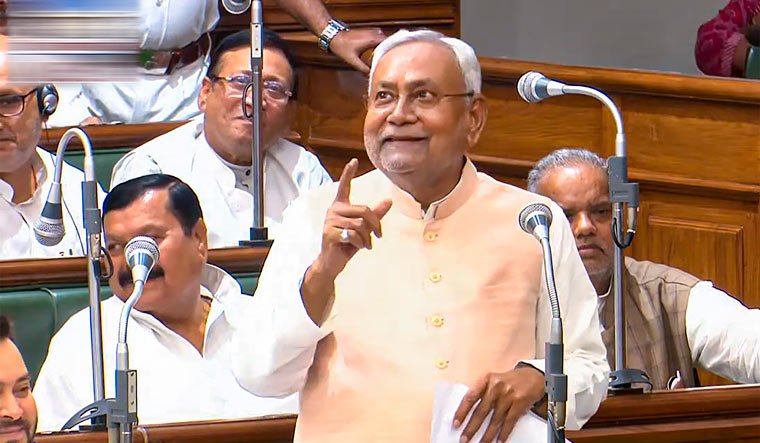
During the last few weeks, Bihar’s Chief Minister Nitish Kumar has managed to stay in the news headlines for all the wrong reasons. His speeches and interjections, made on the floor of the Bihar Assembly, not only flouted all the rules of propriety of public speeches and decorum of public space but also used a misogynist and feudal language whose parallels had begun to disappear from the much-maligned Indian political space. Nitish Kumar’s political rhetoric has failed to resonate with the hopes and aspirations of the people of Bihar for quite some time now; however, this recent assembly discussion on population control has brought a new low to his public conduct. For someone who was upholding the principles of social justice days ago and was fashioning himself as a flag-bearer of the I.N.D.I. Alliance, his barrage of questionable remarks against a senior Dalit leader and a former Chief Minister of Bihar, Shri Jitan Ram Manjhi brought to light a patronising mindset that belies his claim to be a social justice champion. Colloquial Bihari Hindi cannot be blamed for his tasteless and tactless use of the language. Irrespective og his apologies, his utterances need deeper scrutiny.
Crisis of Rhetoric
In an increasingly partisan environment that expands ever more in the public sphere today, one of the biggest casualties of the resultant public discourse has been the language itself. Rhetorics or, rather, the lack of it has come to constitute our public discourse without arousing even whimpers in most quarters. Under the mentorship of electioneering specialists, political leaders are perhaps more concerned about getting their message across rather than uplifting the contemporary public discourse through the subtleties of sophisticated language. In what appears to be an increasingly democratic public space where stakeholders opt for traditional media as well as various platforms of social media to reach out to diverse constituencies, the politicians cannot be blamed for resorting to blunt language rather than looking for euphemisms and rhetorical nuances. In the interest of our electorate, any kind of standardised political or public rhetoric should be avoided, and a democratic, mass-targeting discourse is perhaps preferred as the Indian polity strives to make the public sphere more sensitive and inclusive.
Crudeness and Insensitivity
What is demanded, nonetheless, from our electoral and thought leaders today is to learn and imbibe a language conveying sensitivity, respect, and perhaps even empathy to maintain a healthy public sphere. With the rise of identity politics and constitutional modernity, it has also become imperative to add inclusivity and sensitivity to political rhetoric. Given the constitutional post that he holds, Nitish Kumar must be blamed for underestimating the public’s preference for appropriate language for talking about women’s education, sex education, or even the caste issue, shunning the vulgarity that he brought to the assembly floor.
In a rather graphic manner and with a smirking face, the Chief Minister of Bihar insensitively described how an educated woman could avoid falling pregnant. He was not delivering lessons in “sex education” as another political leader from Bihar chose to describe it. Derogatory words have no place in education in any sense of the term. Professor and Scholar Amrita Basu in her essay on “Gender and Politics” writes that political parties need “to provide women access to the networks and resources” in order to give them agency. It is lamentable that Nitish Kumar chose to speak as he did in the circumstances. It is only recently that the Parliament has passed the Women’s Reservation Bill ensuring 33% political representation by women leaders. This momentous step to increase women’s representation is a testimony to the increasing relevance attached to women’s roles in political parties and society in general.
Similarly, Nitish Kumar’s derisive attack on serving Bihar MLA Shri Jitan Ram Manjhi betrayed the sense of entitlement that casteist forces retain while negotiating the presence of political representatives from Scheduled Castes and Scheduled Tribes in the political sphere. “Ee toh meri murkhta se Mukhyamantri bana” (This one became a Chief Minister because of my stupidity.) said Nitish Kumar in the state assembly. The uphill political journeys of leaders of marginalised communities through patriarchal, caste-ridden societies have often been beset by insensitive and demeaning innuendos, apart from targeted atrocities intended to keep them out of the public sphere and deny them political representation. Political rhetoric has wide-ranging implications and should keep the public good as a guiding principle.
Conclusion
Nitish Kumar’s predecessor Lalu Prasad used a dialect-laden colloquial Hindi to undermine social hierarchies and even used informal phrases around “lathi” and “bhains” to communicate to the masses which he thought to be uneducated decades ago. Lalu Prasad may have been very effective in building his political persona out of his clever use of words. On the other hand, Nitish Kumar has used for years a dry and impersonal style for public consumption but is now resorting to crude words and tasteless innuendos that give a poor image of the rather stark socio-economic reality of contemporary Bihar. What national consumers of news media heard from him in the last weeks doesn’t even surprise the people of Bihar anymore, unfortunately.






Very well-written article that exposes the degeneration in our political field..
Excellent article, these so called senior leaders, regularly make this kind of statements to be in headlines, some people like Rahul always make irresponsible statements and that’s the only way they have to be in public mind. This one way reflects the quality of these so called leaders, other side they underestimate common public of Bharath. People of Bharath see these leaders and their statements as entertainment and they never take them seriously. But these politicians and parties wants to keep public discourse at this level, so that they stand to gain.